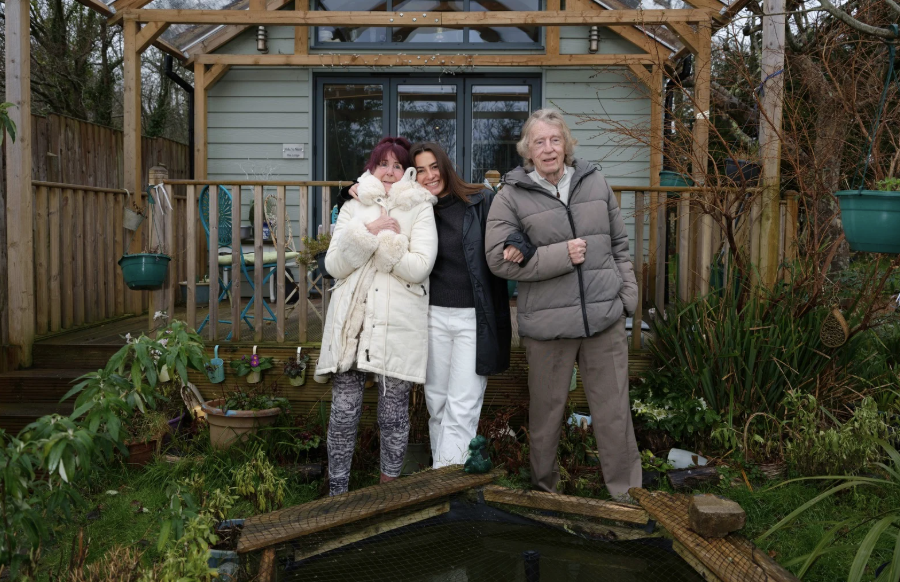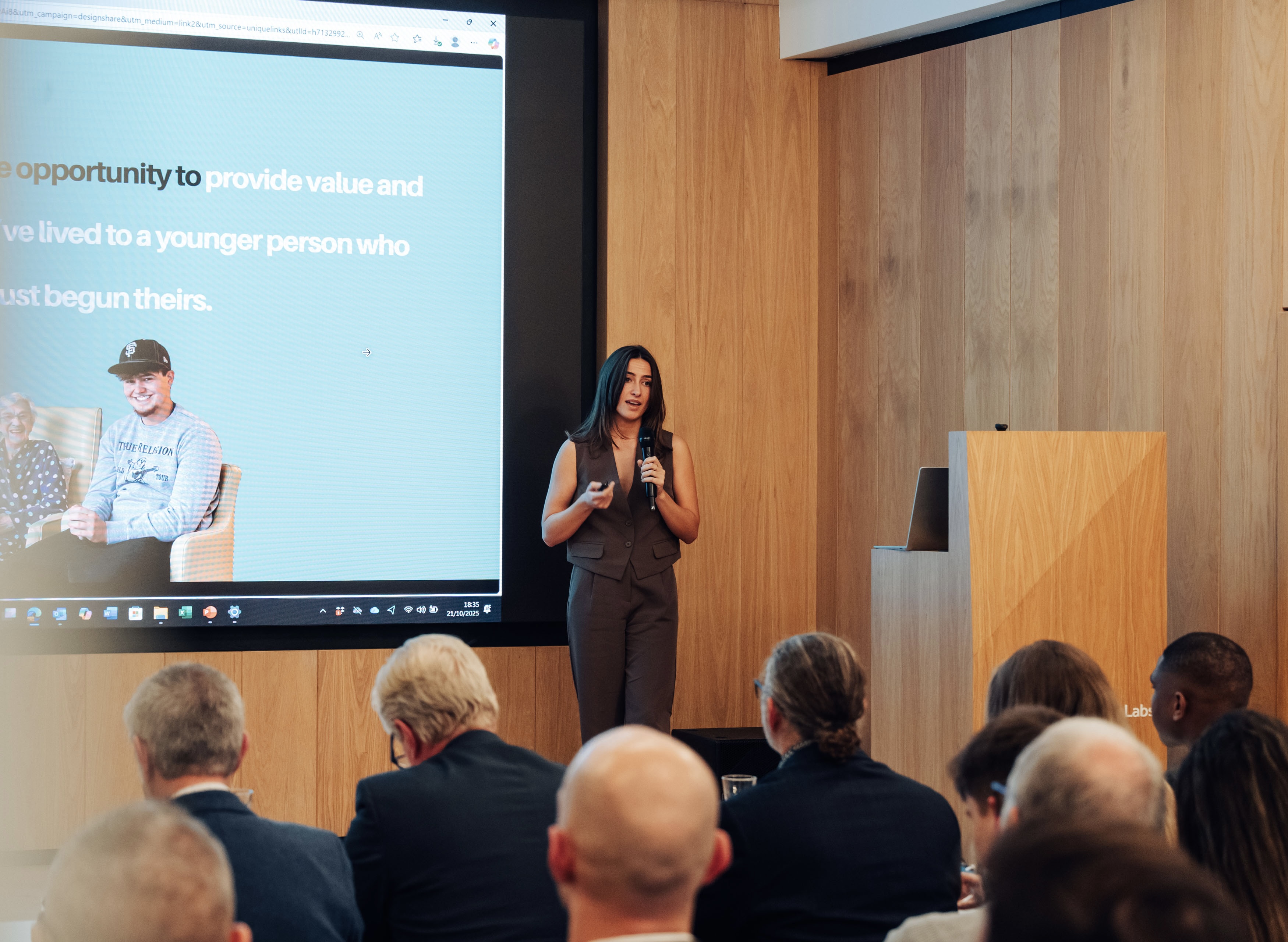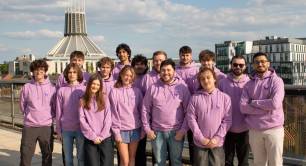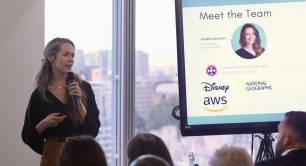Companionship platform wins Ignite social enterprise pitching contest
The initial spark for a social enterprise that could offer companionship for isolated elderly people first came to Solene Declas when she was helping her nan with some household chores.
“I did my nan’s bedsheets once and she was like, ‘You don’t realise how much this has helped’. She was thanking me so much and I was like, ‘It’s ok, it took me, like, two minutes’.”
 While Solene’s nan and grandad live at the end of her parents’ garden (pictured, right) and also have each other for support, Solene says that this seemingly trivial exchange with her nan “just got me thinking” that many elderly people weren’t so lucky to have a partner, or family and friends close by.
While Solene’s nan and grandad live at the end of her parents’ garden (pictured, right) and also have each other for support, Solene says that this seemingly trivial exchange with her nan “just got me thinking” that many elderly people weren’t so lucky to have a partner, or family and friends close by.
“So I thought, maybe there’s a gap in the market for helping people who just need that, mainly companionship and addressing the loneliness crisis.”
I thought, maybe there’s a gap in the market for helping people who just need that, mainly companionship and addressing the loneliness crisis
In typical social entrepreneur fashion, Solene decided to build a solution – in the form of the companionship platform AIBŌ, which she launched in September 2024.
A year on, and she has just been awarded top place and £20,000 in Ignite, a competition created by the Ford Family Foundation to support social enterprise ideas emerging from universities and recent graduates.
Solene, who recently achieved a first class degree in Psychology from Kings College London, explains that AIBŌ – which stands for ‘buddy’ in Japanese – is a platform that matches young people aged 18-30 with elderly people who live in their area, not for care, but for companionship and practical weekly help – anything from shopping and gardening to posting letters and help with technology.
AIBŌ matches the companions using three criteria: personality, interests and career aspirations – with the last criteria aimed at giving an opportunity for the elderly person to mentor the young person so that they also feel needed.
“One thing my nan said to me is that when you get older, you feel less needed and that no one relies on you, so I really wanted to integrate this into the model,” says Solene.
All the young people are DBS-checked and a family member of the elderly person is also involved in the process.
The elderly person is charged £22.50 per hour, students get paid £15 an hour and the remainder goes to the social enterprise.
One thing my nan said to me is that when you get older, you feel less needed and that no one relies on you, so I really wanted to integrate this into the model
Solene already has several hundred sign-ups and is trialling the platform in her local area of Chichester, West Sussex, with the aim of growing a companionship network across the UK.
 On winning the top prize this week, Solene (pictured, left, making her winning pitch) commented: “I was blown away by the other finalists and am overwhelmed to have won. The funding will make a huge difference because although we have active pairings, we are still proving the concept and working out the mechanics. I’m excited to start working on the plan to launch the first MVP [minimum viable product] of the AIBŌ app, which we look forward to scaling out nationwide so that many more older and younger people can enjoy sharing their experiences with each other.”
On winning the top prize this week, Solene (pictured, left, making her winning pitch) commented: “I was blown away by the other finalists and am overwhelmed to have won. The funding will make a huge difference because although we have active pairings, we are still proving the concept and working out the mechanics. I’m excited to start working on the plan to launch the first MVP [minimum viable product] of the AIBŌ app, which we look forward to scaling out nationwide so that many more older and younger people can enjoy sharing their experiences with each other.”
Ford Family Foundation founder Tony Ford added: “AIBŌ shows how technology can be applied responsibly to improve wellbeing and create genuine impact, and supporting social entrepreneurs like Solene is exactly why we started the Foundation. The calibre of founders we’ve seen through Ignite this year has been truly outstanding. Their pitches were inspiring and they should all take immense pride in building something special. We are proud to support them all and we look forward to seeing them achieve great success in the years ahead.”
The Ignite final was was hosted at Barclays Innovation Hub powered by Eagle Labs in Shoreditch, London, on Tuesday 21 October. A £50,000 prize pot was shared between the six finalists. Last year’s winners were awarded a further £280,000 after due diligence.
The other five Ignite finalists, who share £30,000 were:
WeDonate – awarded £10,000
A platform designed to encourage blood donation through community rewards to help counter national shortages. University of Chichester student Stephen King created the tool so that hospitals gain a more reliable supply of blood, donors are recognised and rewarded for their contributions, and local businesses benefit from increased custom.
Reporti – awarded £7,500
A safeguarding app designed to keep people safe at crowded events, allowing users to quickly report incidents such as harassment, assault, or unsafe behaviour. Imperial College and Royal College of Art student Gracie Broom created the platform to ensure vulnerable groups have a clear, effective way to raise concerns.
Rephobia – awarded £6,000
Queen’s University Belfast student Liam Harte is using virtual reality to deliver accessible therapy for people living with phobias such as fear of flying, heights, or social situations. With potential applications in clinics, schools, and direct-to-consumer use, Rephobia aims to provide effective, affordable tools that help people build confidence and independence.
Harker – awarded £4,000
A CRM system designed to support homelessness charities with vital data insights. University of Liverpool student James Barber is on a mission to simplify how charities record and interpret information, enabling them to improve services, strengthen funding applications, and ultimately support more people out of homelessness.
Braille Forge – awarded £2,500
Affordable braille technology to improve access to STEM education for visually impaired students. Brunel University student Jonny Parker is striving to positively influence long-term employment prospects for visually impaired learners, who currently face prohibitively expensive costs that limit access to subjects where tactile learning materials are essential.
The six social venture finalists received pitching and bespoke accelerator support from Ignite innovation partner Barclays Eagle Labs, as well as access to digital resources. The keynote speaker at Ignite 2025 was EqualReach founder Giselle Gonzales, whose business received significant funding from the Ford Family Foundation after pitching at the inaugural Ignite event at The Shard last year.
In the three years since inception, the Ford Family Foundation has provided over £1.9m in funding across the charitable and social enterprise sectors.
Main photo above: the Ignite 2025 finalists pictured with Ford Family Foundation founder Tony Ford and his sons.
| Ready to invest in independent, solutions-based journalism?
Our paying members get unrestricted access to all our content, while helping to sustain our journalism. Plus, we’re an independently owned social enterprise, so joining our mission means you’re investing in the social economy. |




